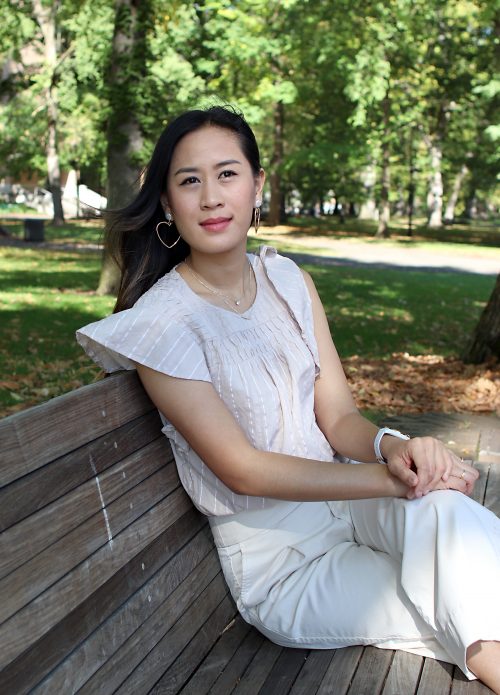This content was published: October 19, 2020. Phone numbers, email addresses, and other information may have changed.
Domestic Violence Awareness Month underscores PCC’s crucial support network
Photos and Story by James Hill
As more people are quarantining at home, the COVID-19 pandemic has caused an increase in the number of people seeking help to flee from an abusive partner. While one in four women in the U.S. experience relationship or intimate partner violence, Black, Indigenous and People of Color (BIPOC) are even more impacted.
“Because of our commitment to equitable opportunity for all, community colleges serve a higher number of individuals with marginalized identities than do private higher education institutions,” said Portland Community College President Mark Mitsui.
This is why PCC is recognizing October as Domestic Violence Awareness Month (DVAM), showcasing the college’s robust infrastructure for reporting, support and awareness around issues of domestic violence and abuse. Years ago, a partnership was initiated by the Women’s Resource Center (WRC) and Office of Equity and Inclusion (OEI), and has grown into a collaboration with the Multicultural, Queer Resource and Veteran’s Resource centers; DREAMers Center; Disability Services; and the Student Conduct & Retention and Counseling departments.
Outreach and Advocacy Project
If you have experienced harm resulting from intimate partner/dating violence, sexual violence, harassment, or stalking, or have questions and want to talk to someone, PCC has a webpage that contains specific resources and support. The page connects people with a confidential advocate, available support resources, reporting options, related events and how to support a survivor.
Collaboration Provides Critical Help
Through the U.S. Department of Justice’s Victim of Crime Act grants, the Outreach and Advocacy Project is a cross-department effort to enhance support services to students across the college. Dedicated to social justice, the project works from an anti-racism framework and is committed to enhancing culturally responsive services and access for students.
“Survivors with diverse and intersecting identities have unique barriers to accessing support that is rooted in systemic oppression,” said Hayley Hayes, Outreach & Advocacy Project response lead. “Through partnerships, the Advocacy Project aims to improve healing opportunities for all survivors at PCC.”
The project’s staff provide confidential direct services and resources to students. In addition, they develop best-practice protocols that are implemented across the district and host training opportunities for employees to improve college culture and response to students. Since Oct. 2018, service providers through the Women’s and Queer resource centers, as well as the Outreach and Advocacy Project report approximately 270 students have received services and more than 250 events, meetings and activities have taken place since February of 2019 that have raised awareness and provided information.
“Experiences of gender-based violence are not uncommon and can take many forms,” said Caroline Bartlett, who is the project’s coordinator. “I am so excited that through strong partnerships, students are experiencing new ways to receive support across PCC, and in ways that are culturally relevant to their identities.”
Title IX
Title IX is another way that the college helps victims of domestic violence, abuse and harassment. It is a federal civil rights law passed in 1972 that prohibits sex-based discrimination (sexual harassment, domestic violence, sexual misconduct and stalking) in most education programs in the United States. In addition, Oregon laws also protect PCC students, faculty, and staff from sex- and gender-based discrimination and misconduct. OEI is responsible for administering college policies that implement these laws, including providing support, remedies and procedures to respond.
“PCC and the Office of Equity and Inclusion are committed to equitable student success and fostering an environment where everyone can reach their fullest potential,” said Chief Diversity Officer Tricia Brand.
WRC Student Advocates
For more than 20 years, the WRC’s central mission has been to support students affected by gender-based violence. All staff are trained and certified confidential advocates who support students affected by relationship and/or sexual violence, harassment or stalking. The centers initiated and helped write the grant application that funded the current Outreach and Advocacy Project along with staff from the Multicultural and Queer resource centers.

Tunyanit Khuankhruea said the issue of domestic violence and abuse is something that is not dealt with back home in Thailand.
In addition, the WRC Leadership Programs are staffed by students who complete year-long internships focused on social justice issues, such as gender-based violence, providing peer support and assisting with prevention. This year, in partnership with other Identity Based Equity Centers, the students are offering a calendar of events to help those affected by abuse and violence.
Tunyanit Khuankhruea is a passionate WRC advocate. The issue of domestic violence and abuse is something that is rarely addressed in Thailand, where Khuankhruea grew up. In this time of COVID-19, she is working with the centers to provide the PCC community with informative DVAM Zoom backgrounds via social media to download and use during online classes and meetings.
“I came from a culture where people don’t talk about domestic violence,” said Khuankhruea, who is a student in the Electronic Engineering Technology Program and is aiming to graduate with an associate degree in 2021. “When victims report it, police don’t take it seriously and there is no legal process that can help investigate. When the victim has no rights, they stop talking about it and they give up.
“I want to raise awareness of domestic violence and I want people to know what to do if it occurs to them,” she added. “Domestic violence is a complex issue and it not only impacts the victim physically, but also impacts them mentally in the long term.”
